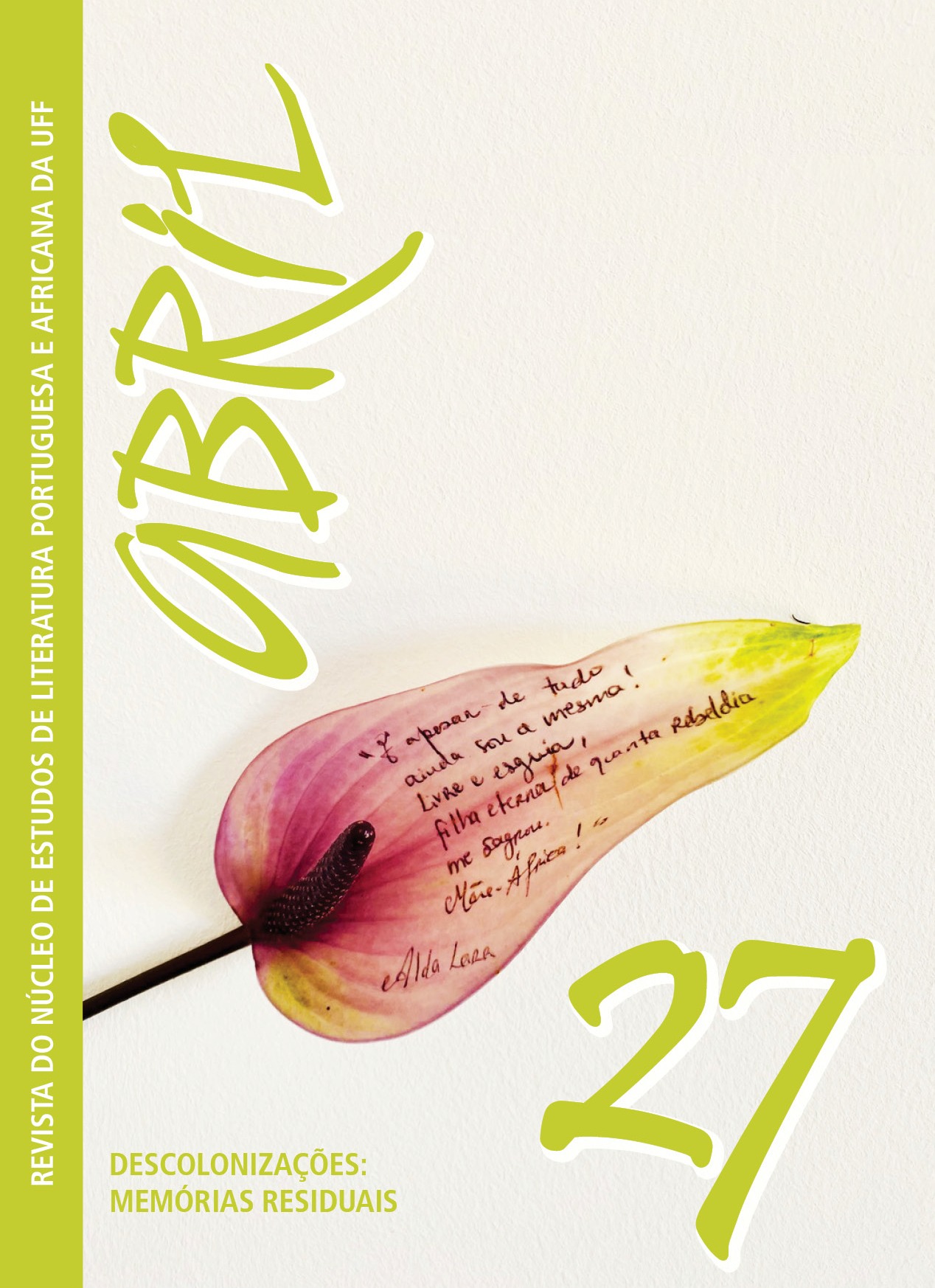Housing in Mozambique – plurality in mozambican cinema
DOI:
https://doi.org/10.22409/abriluff.v13i27.50265Keywords:
Housing, Cultural Memory, Docufiction, MozambiqueAbstract
‘Housing’ still represents a topic that seems to be largely unaddressed in relation to film. Although Düllo (2008, p. 358) states in his article Wohnen im Film that the respective living situations of film characters are decisive for their localisation in life and action i.e. their anchoring in the diegetic levels, the specific design of living space has so far been regarded as of little importance. Yet, it is precisely aspects such as the localisation of the protago nists in the living space as well as the individual design of these spaces - the spacing (DÜLLO, 2008, p. 369f) - that provide essential information about the way in which they find themselves embedded culturally, socially, psychologically and by way of identity within the film. In this way, film viewers gain significant insights into the characters’ lives and development. Besides the situational insights into the life of the various individuals represented, films make concrete and visible statements about the cultural contexts of the characters, regions, spaces and countries shown by means of the staging of living situations. Films depict different housing cultures. Thus, depicted flats, houses, places and non-places (AUGÉ, 1994), i.e. all the different ‘living’ situations medialised in films, represent the diverse cultural and geopolitical contexts in which the film characters reside. The staged living spaces allow conclusions to be drawn about individual or collective living cultures, i.e. about the status that a living space carries in various cultures and the possibilities of having, maintaining, designing or not having living space.
---
Original in German.
Downloads
References
GRANDE Hotel. Regie: Lotte Stoops. Produktion: Serendipity Films / Volya Films. Belgien: Serendipity Films, 2010. (70 min.). URL: https://www.serendipityfilms.be/grande-hotel. Letzter Zugriff: 24.05.2021.
HÓSPEDES da Noite. Regie: Licínio Azevedo. Produktion: Ébano Multimedia. Moçambique : Marfilmes, 2007. 1 DVD. (53 min.).
AUGÉ, Marc. Orte und Nicht-Orte. Vorüberlegungen zu einer Ethnologie der Einsamkeit. 2. Auflage. Übersetzung.: Michael Bischoff. Frankfurt a. M.: Fischer Verlag, 1994. Original: Non-Lieux. Introduction à une anthropologie de la surmodernité.
AUMONT, Jacques. L’image. Paris: Nathan, 1990.
BARTHES, Roland. Le bruissement de la langue. Essais critique IV. Paris : Éditions du Seuil, 1984.
BLUM, Philipp. Doku-Fiktionen: Filme auf der Grenze zwischen Fiktion und Non-Fiktion als ästhetische Interventionen der Gattungslogik. MEDIENwissenschaft, H. 2, p. 130-144, 2013.
BOLLNOW, Otto Friedrich. Der Mensch in der Spannung zwischen öffentlicher und privater Sphäre. In: PROHASKA, Leopold; HAIDER, Franz (org.). Jugendgemäße Lebenskunde in der Entscheidung. Wien: Österr. Bundesverl. für Unterricht, Wissenschaft und Kunst, 1970. p. 17-27.
BOLLNOW, Otto Friedrich. Der Mensch und der Raum. Universitas, 18. Jg., p. 499-514, 1963.
BOLLNOW, Otto Friedrich. Tür und Fenster. Die Sammlung, 14. Jg., p. 113-120, 1959.
DÜLLO, Thomas. Wohnen im Film. In: SCHROER, Markus (org.), Gesellschaft im Film. Konstanz: UVK Verl.-Ges., 2008. p. 357-393.
GESCHKE, Sandra Maria. Doing Urban Space: Ganzheitliches Wohnen zwischen Raumbildung und Menschwerdung. Bielefeld: transcript, 2013.
GRANDE HOTEL. Regie: Anabela de Saint-Maurice. Produktion: Ana Lucas. Portugal: RTP, 2007 (52 min.). URL: https://www.cultureunplugged.com/documentary/watch-online/play/7430/Grande-Hotel. Letzter Zugriff: 24.05.2021.
HATTENDORF, Manfred. Dokumentarfilm und Authentizität: Ästhetik und Pragmatik einer Gattung. 1. Auflage. Konstanz: Ölschläger, 1994.
HIßNAUER, Christian. MöglichkeitsSPIELräume: Fiktion als dokumentarische Methode. Anmerkungen zur Semio-Pragmatik fiktiver Dokumentationen. MEDIENwissenschaft, H. 1, p. 17-28, 2010.
HICKETHIER, Knut. Film- und Fernsehanalyse. 3. überarb. Auflage. Stuttgart: J.B. Metzler, 2001.
KIENER, Wilma. Die Kunst des Erzählens: Narrativität in dokumentarischen und ethnographischen Filmen. Konstanz: UVK-Medien, 1999.
MUNDHENKE, Florian. Zwischen Dokumentar- und Spielfilm: Zur Repräsentation und Rezeption von Hybrid-Formen. Wiesbaden: Springer, 2017.
PUTSCH, Christian. Wenn aus Luxus-Hotels Geisterhäuser werden. Welt, 2010. URL: https://www.welt.de/reise/Fern/article11526639/Wenn-aus-Luxus-Hotels-Geisterhaeuser-werden.html. Letzter Zugriff: 24.05.2021.
SPINUZZA, Giulia. O ciclo do Grande Hotel da Beira: os documentários Grande Hotel, de Lotte Stoops; Grande Hotel, de Anabela Saint-Maurice; Hóspedes da Noite, de Licínio Azevedo e Amanhecer a Andar, de Sílvia Firmino. Remate de males, Campinas-SP, v. 38, n. 1, p. 161-185, 2018.
SPINUZZA, Giulia. Olhares cruzados sobre o Grande Hotel da Beira: Hóspedes da Noite, de Licínio Azevedo, e ‚Casa de Ferro’, de João Paulo Borges Coelho. Cerrados, v. 41, p. 276-287, 2016.
WELSCH, Wolfgang. Unsere postmoderne Moderne. 7. Auflage. Berlin: Akademie Verlag, 2002.
Downloads
Published
How to Cite
Issue
Section
License
Copyright (c) 2021 ABRIL – NEPA / UFF

This work is licensed under a Creative Commons Attribution-NonCommercial 4.0 International License.
I authorize the journal Abril - NEPA/UFF to publish the paper of my authorship/responsibility that I now submit, in case it is accepted for online publication.
Moreover, I declare that this contribution is original, that it was not submitted to any other editor for publication, and I sign the present declaration attesting the truth of all its contents.
The copyright of the works published at the virtual space of the journal Abril - NEPA/UFF are automatically entitled to the journal. Their total or partial reproduction is conditioned to the authors' citations and publication data.

Abril is licensed under a Creative Commons - Attribution-NonCommercial 4.0 International (CC BY-NC 4.0).









